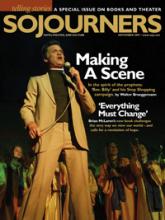Any society or civilization at any given time lives by a dominant framing story, a story that gives its common life a coherent shape and direction. That story will no doubt evolve and adapt over time, for better or for worse, borrowing from or reacting to the stories of its neighbors. To understand a society, then, and certainly to change it, we must make its covert framing story more overt and realize its power—sometimes awe-inspiring, sometimes awful.
For example, if our framing story tells us that we humans are godlike beings with godlike privileges—intelligent and virtuous creatures outside a limited environment of time and space, without potentially fatal flaws—we will have no reason to acknowledge or live within limits, whether moral or ecological. Similarly, if our framing story tells us that the purpose of life is for individuals or nations to accumulate an abundance of possessions and to experience the maximum amount of pleasure during the maximum number of minutes of our short lives, then we will have little reason to manage our consumption.
But if our framing story tells us that we are free and responsible creatures in a creation made by a good, wise, and loving God, and that our Creator wants us to pursue virtue, collaboration, peace, and mutual care for one another and all living creatures, and that our lives can have profound meaning if we align ourselves with God’s wisdom, character, and dreams for us, then our society will take a radically different direction, and our world will become a very different place.
Read the Full Article

